South Bank at Quarry Trails
- 91 units available
- Studio • 1 bed • 2 bed • 3 bed
- Amenities
In unit laundry, Patio / balcony, Granite counters, Pet friendly, Stainless steel, Walk in closets + more

Atlanta is known for its rich history, booming industries, and vibrant Southern culture. The city played a pivotal role in the Civil Rights Movement, shaping the nation’s progress through leaders like Martin Luther King Jr. More recently, it has become a powerhouse in film, music, and business, earning nicknames like the Hollywood of the South.
With tree-lined streets, world-class dining, and a passionate sports culture, Atlanta is a city that appeals to both visitors and those looking to call it home. Whether you’re exploring for a weekend or considering a move, this city offers something for everyone.
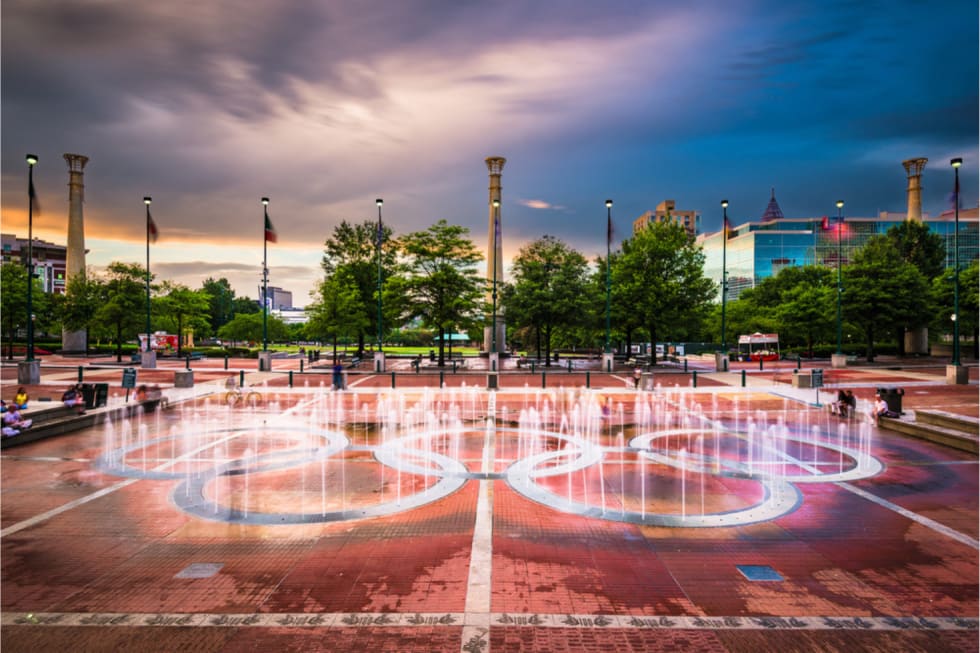
Centennial Olympic Park is a 22-acre green space in the heart of downtown Atlanta that was originally constructed to host the 1996 Summer Olympic Games. The park welcomes millions of visitors each year and hosts a variety of events, from the Wednesday Wind Down summer concert series to the SweetWater 420 Fest and the Look Up Atlanta Independence Day Celebration. As the center of a bustling tourist district, the park is surrounded by some of Atlanta’s most popular attractions, including the Chick-fil-A College Football Hall of Fame, the National Center for Civil and Human Rights, the World of Coca-Cola, the Georgia Aquarium, and the Children's Museum of Atlanta.
One of the park’s most beloved features is the Fountain of Rings, the world’s largest interactive fountain incorporating the Olympic Rings symbol. This iconic attraction entertains visitors of all ages with synchronized water shows set to music, complete with dazzling sound and lighting effects. The park also serves as a gathering place for major cultural celebrations, such as the Juneteenth Atlanta Parade and Music Festival.
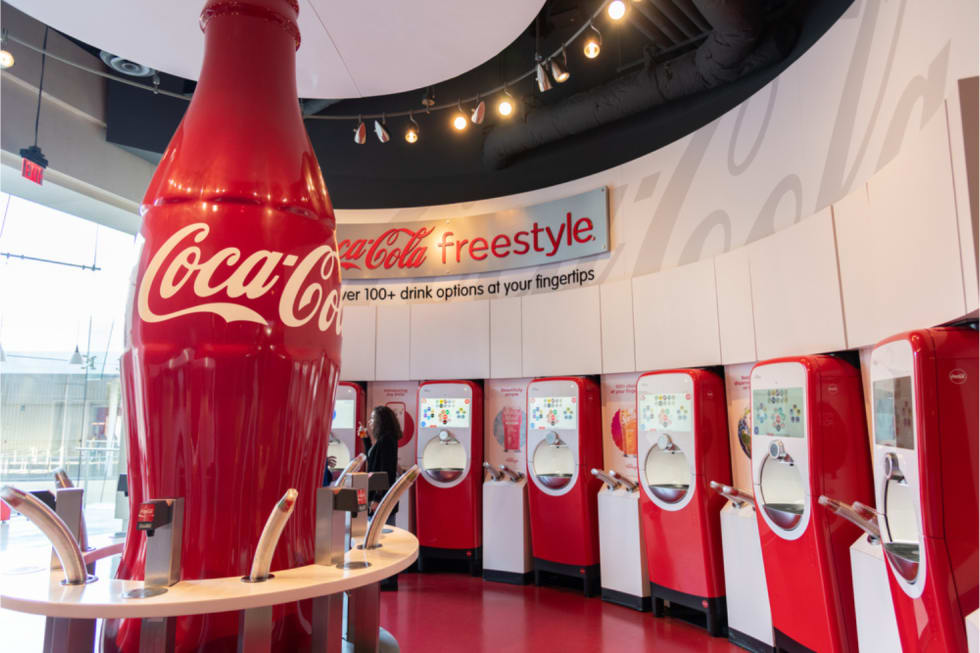
The World of Coca-Cola in Atlanta is an immersive tour of the history and legacy of one of the world’s most iconic brands. Visitors can explore interactive exhibits, including the vault that holds Coca-Cola’s secret formula, a gallery of memorabilia and artwork, and a tasting room featuring over 100 beverages from around the world. The museum also provides fun photo opportunities, including a chance to meet the beloved Coca-Cola polar bear.

The Georgia Aquarium is the largest aquarium in the United States and the sixth-largest in the world, offering an awe-inspiring look at marine life from around the globe. Home to thousands of animals spanning hundreds of species, the aquarium’s seven major galleries take visitors through diverse aquatic habitats, from the depths of the ocean to vibrant coral reefs and freshwater rivers. With over 11 million gallons of water, the facility provides an immersive experience, allowing guests to witness marine life up close and learn about vital conservation efforts.
Among the aquarium’s most famous residents are its whale sharks, making it one of the few places in the world where visitors can see these gentle giants. Other notable species include beluga whales, California sea lions, bottlenose dolphins, manta rays, sea otters, and tiger sharks.
At Zoo Atlanta, visitors can interact with a variety of animals, from classic favorites like tigers and bears to more unique residents like sloths and one of North America’s largest populations of great apes. The zoo is also a leader in reptile and amphibian care, showcasing over 70 species. Designed for visitors of all ages, the zoo features kid-friendly attractions like a carousel, train ride, and petting zoo, making it a fun and educational experience for families.
For a truly magical visit, IllumiNights transforms the zoo into a glowing wonderland during the holiday season with more than 200 handcrafted lanterns of pandas, octopi, alligators, and more.
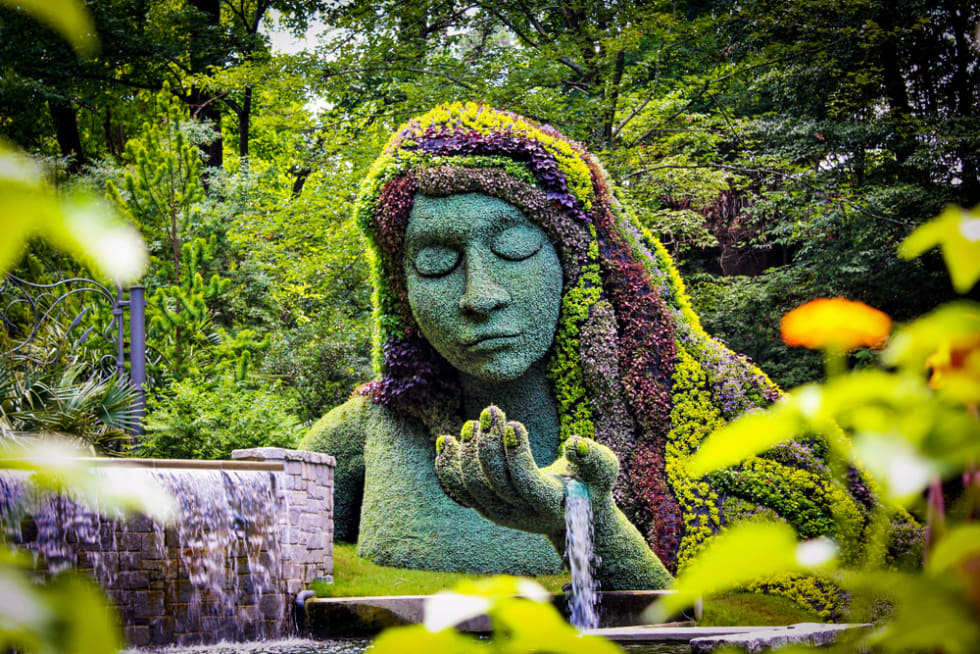
Located beside Piedmont Park, the Atlanta Botanical Garden spans 30 acres, offering a stunning blend of horticultural beauty, conservation, and education. Since its founding in 1976, the garden has become a sanctuary for plant lovers and nature enthusiasts, featuring meticulously curated plant collections and seasonal exhibits. One of its most popular attractions is the Fuqua Orchid Center, home to the largest permanent collection of orchid species in the U.S. The center showcases rare high-elevation orchids never before grown in the Southeast and hosts the annual Orchid Daze exhibit each winter, displaying exotic blooms in a lush tropical setting.
Other highlights include the Kendeda Canopy Walk, which offers visitors a unique perspective of Atlanta’s urban forest. This 600-foot-long skywalk, suspended 40 feet above the ground, winds through the treetops of Storza Woods, providing an unforgettable view of towering oaks, hickories, and poplars. During the holiday season, the garden transforms into a dazzling wonderland with Garden Lights, Holiday Nights, which is an annual event featuring over 1 million LED lights arranged in eye-catching displays.

Stone Mountain Park is a 3,200-acre park that incorporates outdoor activities with historical exhibits. Visitors can either take a train ride or hike to the summit of Stone Mountain for breathtaking 360-degree views of Atlanta or explore the park’s 15 miles of wooded trails. The park’s serene lakes also provide opportunities for fishing, kayaking, and paddleboarding.
In addition to the natural landscapes, Stone Mountain has deep historical significance, with ties to both Native American heritage and the Civil War era. Guests can explore a collection of restored 18th- and 19th-century homes and buildings, as well as historical exhibits that shed light on the area’s past. The park’s most famous feature, the Confederate Memorial Carving, stands as a controversial yet notable piece of history, depicting Jefferson Davis, Robert E. Lee, and Stonewall Jackson.
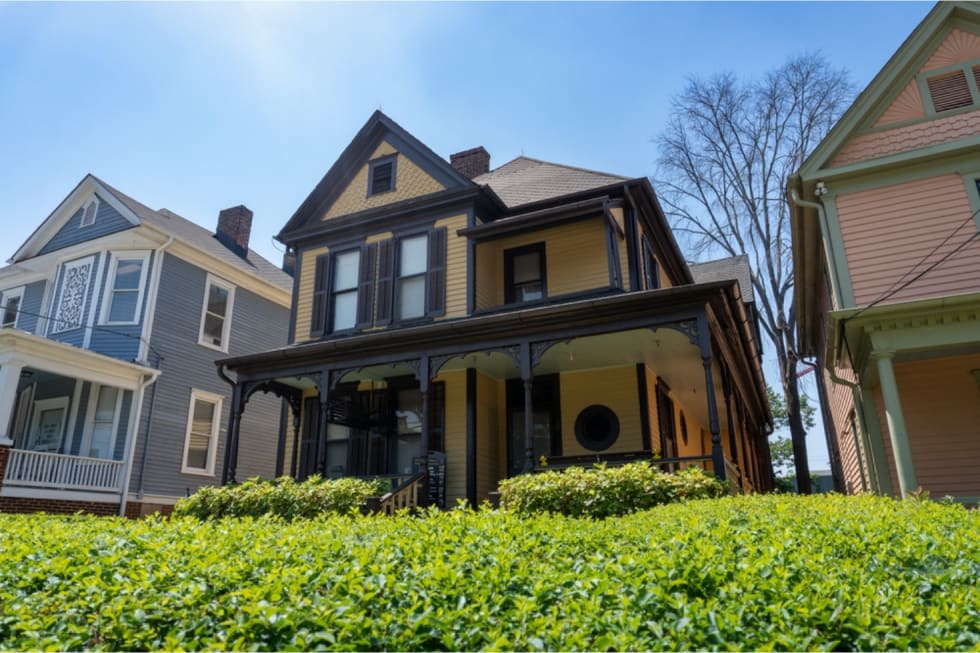
Atlanta is often called the cradle of the modern Civil Rights Movement, with deep historical ties to the struggle for racial equality in the United States. Dr. Martin Luther King Jr., one of the movement’s most influential leaders, was born in Atlanta and followed in the footsteps of his father and grandfather as a minister at Ebenezer Baptist Church. Today, his legacy is honored at the Martin Luther King Jr. National Historical Park, a 35-acre site featuring landmarks such as his birth home, Ebenezer Baptist Church, and The King Center, where Dr. King and Coretta Scott King are laid to rest.
Atlanta’s civil rights legacy also includes neighborhoods like Sweet Auburn, home to the historic business district that once thrived as a center for Black entrepreneurship and activism. At the National Center for Civil and Human Rights, visitors can see original drafts of MLK’s most famous speeches and the Wall of Martyrs with photos of those who lost their lives in the Civil Rights Movement.
![What Is Atlanta Known For? [2024]](https://cdn.apartmentlist.com/image/fetch/f_auto,q_auto,t_renter_life_article/https://images.ctfassets.net/jeox55pd4d8n/41MXo5C6idPeEeXH07rRbe/cdfb64785178ad18cfdb5d760186f9b4/Untitled_design__5_.png)
Atlanta is a city where sports culture runs deep, with a particular passion for college football. With six stadiums seating over 80,000 fans each, Saturdays in the South are more than just game days—they’re a way of life. Atlanta is home to the Georgia Tech Yellow Jackets and Georgia State Panthers and serves as the host city for the SEC Championship Game. Annual events like the Aflac Kickoff Game, the Celebration Bowl, the MEAC/SWAC Challenge, and the prestigious Chick-fil-A Peach Bowl are all hugely popular events.
In addition, Atlanta is home to the Atlanta Braves (MLB), Atlanta Hawks (NBA), Atlanta Falcons (NFL), and Atlanta United FC (MLS). These teams bring excitement year-round, with the Braves continuing to build on their championship legacy and Atlanta United drawing some of the most passionate soccer crowds in the country.
Going beyond professional sports, there are a number of other popular sports in the city. For example, there is a strong running culture with major races like the Peachtree Road Race, the world's largest 10K, and the Atlanta Marathon. Atlanta also has a deep-rooted roller-skating culture that has become a defining part of its recreation and nightlife scene. With historic rinks and a vibrant skate community, roller-skating is a beloved sport that thrives across generations.
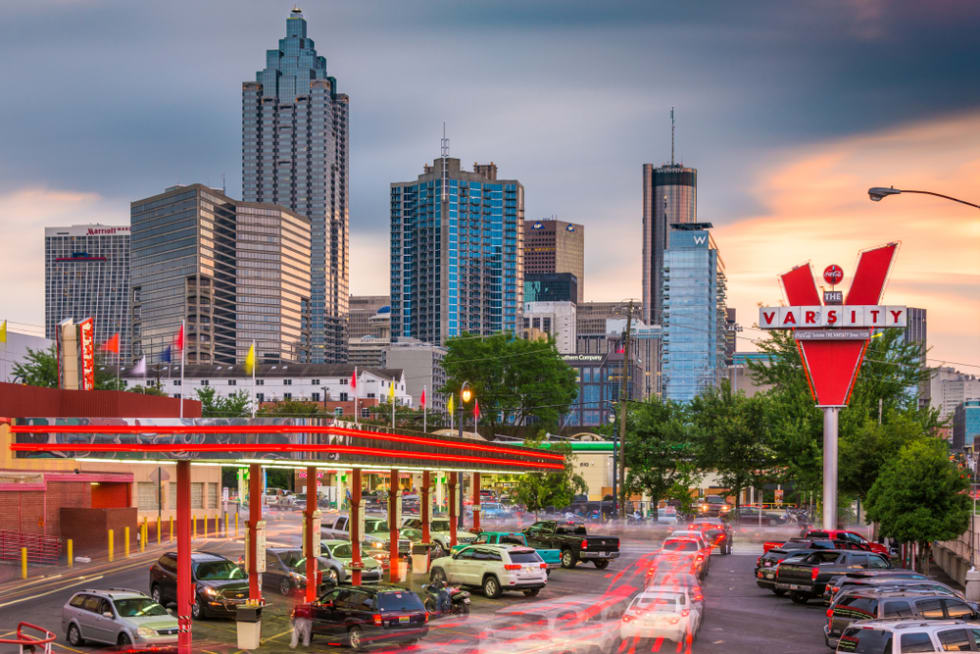
Atlanta’s food scene is a vibrant mix of Southern tradition and global flavors. From iconic staples like The Varsity, the world’s largest drive-in restaurant, to beloved late-night spots like Waffle House, the city is rich in comfort food culture. Chilli dogs and lemon pepper wings are local favorites, with the latter often leaving a trail of discarded bones throughout the city. Atlanta is also the birthplace of Coca-Cola and home to Chick-fil-A, which started in nearby Hapeville.
For those looking to explore international cuisine, Buford Highway is a must-visit, offering authentic flavors from Vietnamese to Indian, Cuban, Korean, Ethiopian, and more. Food lovers can indulge at Mary Mac’s Tea Room for classic Southern dishes or visit historic soul food institutions like Paschal’s and Busy Bee Cafe, once gathering places for Civil Rights leaders. And for a true culinary experience, the annual Atlanta Food and Wine Festival brings together over 200 top chefs each September for a weekend of tastings and gourmet events.

Atlanta is often called the City in a Forest due to its dense tree canopy, with nearly 50% of the city covered in greenery. Unlike many other major metropolitan areas, Atlanta has managed to preserve vast stretches of trees, even as development continues. This abundance of urban forestry not only enhances the city’s aesthetic appeal but also plays a crucial role in reducing heat, improving air quality, and providing a habitat for wildlife. Parks and green spaces are woven throughout the city, giving residents and visitors easy access to nature, whether it’s along the Atlanta Beltline, in Piedmont Park, or within the serene trails of Chattahoochee River National Recreation Area.
If you spend time navigating the city, you’ll quickly notice Atlanta’s love for the word “Peachtree”—with over 70 streets bearing the name. From Peachtree Street to Peachtree Road and Peachtree Battle Avenue, newcomers may find it amusing (or confusing) to navigate the city’s many variations of the name. While many assume it refers to Georgia’s famous peaches, historians believe the name actually originates from “Standing Pitch Tree,” a term used by Native Americans for the region’s plentiful pine trees, which were a key resource for making pitch and tar. Regardless of its origins, “Peachtree” has become an unmistakable part of Atlanta’s identity, appearing on roads, in business names, and even as a local shorthand for the heart of the city.
Living in Atlanta offers the perfect blend of Southern charm and big-city amenities, making it an attractive destination for families, young professionals, and retirees alike. With a lower cost of living compared to cities like New York, Los Angeles, or Chicago, Atlanta provides affordable housing, thriving job opportunities, and a vibrant cultural scene. The city's tree-lined neighborhoods, booming economy, and diverse food scene make it a well-rounded place to call home.
According to the U.S. Census Bureau, the median household income in Atlanta is $81,938, which is slightly above the national median of $78,538. This, combined with Georgia’s relatively low tax burden and the availability of starter homes in the suburbs, makes Atlanta an appealing option for those looking to establish roots in a major metropolitan area without breaking the bank.
For renters, affordability can be gauged using the 30% rule, which suggests spending no more than 30% of take-home pay on rent. If you rent a one-bedroom apartment for $1,498 a month, you need to earn at least $59,920 a year in Atlanta, or $4,993 a month after taxes, to live comfortably. Remember, this is just a general guideline. You may need to earn more if you have student loans, want to save up for a big expense, or plan to travel more.
With a population of 498,715 as of the 2020 census, Atlanta is an ethnically diverse city known for its welcoming atmosphere. As a major cultural hub in the South, Atlanta has long been a beacon of Black excellence, entrepreneurship, and creativity, shaping everything from music to business. The city is also home to a growing immigrant population, with communities from Latin America, Asia, and beyond, adding to its rich cultural fabric. This blend of backgrounds makes Atlanta an exciting place to live, where tradition and innovation coexist.
One of the standout aspects of life in Atlanta is Southern hospitality. Locals are genuinely friendly, and a warm hello or nod to passersby is common wherever you go. The city balances its traditional Southern values with a modern outlook, creating a welcoming environment for newcomers.
Atlanta boasts one of the strongest economies in the United States, ranking as the ninth-largest metro economy in the country. The city is a major player in tech, finance, law, and medicine, with job opportunities continuing to expand in these high-growth industries. Corporations are a significant driver, with the city hosting one of the largest concentrations of Fortune 500 companies in the country. Global giants such as The Coca-Cola Company, The Home Depot, and Delta Air Lines have their headquarters in Atlanta, alongside a range of other multinational businesses.
In recent years, Atlanta has become a powerhouse for film and television production, making it one of the largest film markets outside of Los Angeles. Blockbusters like “Black Panther” and hit TV shows such as “Stranger Things” have been filmed in and around Atlanta, bringing billions in revenue and thousands of jobs to the region. The media industry has deep roots in Atlanta, with CNN, Turner Broadcasting, and Cartoon Network all originating in the city.
Technology is also a growing force in Atlanta’s economy, earning the city the nickname Silicon Peach. With a booming IT sector and a top-six ranking for tech job growth, Atlanta is becoming a hub for startups and established tech firms alike.
Atlanta offers a diverse mix of neighborhoods, each with its own unique character and amenities. Whether you're looking for a vibrant urban lifestyle, historic charm, or a quiet suburban retreat, there's a place for everyone within and around the city.
Looking for the perfect place to call home in Atlanta? Whether you're drawn to the historic charm of Inman Park, the vibrant energy of Midtown, or the family-friendly appeal of Grant Park, Atlanta has a neighborhood that’s perfect for you.
Take the Apartment List quiz to find rentals tailored to your lifestyle and preferences. Start your Atlanta adventure by finding the perfect place to call home—with us, you’ll spend five minutes and save 50 hours searching.
Atlanta is famous for its pivotal role in the Civil Rights Movement, exemplified by landmarks like the Martin Luther King Jr. National Historical Park. The city is a beacon of Southern hospitality, offering a diverse culinary scene and warm welcomes. Atlanta's influence on music, particularly in hip-hop and trap genres, has global reach with artists like OutKast and Future. Iconic attractions such as the Georgia Aquarium and the Fox Theatre highlight Atlanta's cultural richness and innovation, making it a destination for history, entertainment, and culinary experiences alike.
Atlanta's colorful nicknames offer a glimpse into its unique identity. Perhaps the most well-known is "The ATL," a reference to its airport code that's become a badge of pride for residents. Foodies will appreciate "The Big Peach," a nod to Georgia's status as a leading peach producer. History buffs might recognize "The Gate City," a historical nickname referencing Atlanta's role as a transportation hub during the Reconstruction era. Finally, "Black Hollywood" acknowledges Atlanta's thriving film and television industry, a center for Black creativity and talent. No matter what you call it, Atlanta's nicknames reveal a city that's full of character, history, and Southern charm.
Atlanta has over 70 streets with "Peachtree" in their name, a source of perennial confusion for visitors and locals alike. The most famous, Peachtree Street, is a major thoroughfare running through downtown Atlanta.
Hartsfield-Jackson Atlanta International Airport consistently ranks as the world's busiest airport by passenger traffic and number of flights. It serves as a major hub for both domestic and international travel, connecting Atlanta to destinations worldwide.
Atlanta is known for its impressive tree canopy, covering nearly 50% of the city. This extensive green cover not only enhances the city's beauty but also provides shade and promotes environmental sustainability.

In unit laundry, Patio / balcony, Granite counters, Pet friendly, Stainless steel, Walk in closets + more
In unit laundry, Hardwood floors, Dishwasher, 24hr maintenance, Stainless steel, Walk in closets + more